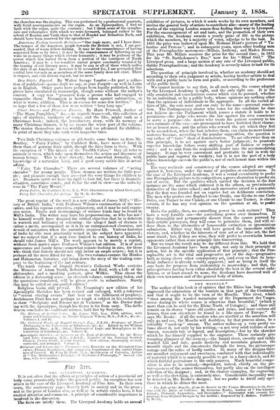finr grts.
THE LIVERPOOL ACADEMY.
It is not often that the affairs or principles of action of a provincial art body come prominently before the general public. An exception has now arisen in the case of the Liverpool Academy of Fine Arts. In their own town, the controversy rages fiercely both in society and in the press ; mad in the press of London also, as well as in artistic circles here, it has excited attention and comment. A principle of considerable importance is involved in the discussion.
The facts are briefly these. The Liverpool Academy holds an annual
exhibition of pictures, to which it sends works by its own members, and invites the general body of artists to contribute also—many of the leading works of the expiring London Beason thus finding their way to Liverpool. For the encouragement of art and taste, and the promotion of their own exhibition, the Academy awards a yearly prize of 601. to the picture which the members, by a majority of votes, adjudge to be the best. In 1851 the prize was bestowed upon Mr. Holman Hunt's picture of "Va- lentine and Proteus"; and in subsequent years, upon other leading men of the Prteraphaelite movement—Millais, Anthony, and Madox Brown. This year Mr. Millais receives the prize for the second time; in 1852 for his "St. Bartholomew's Eve," now for his "Blind Girl." The Liverpool press, and a large section at any rate of the Liverpool public, dislike Prieraphaelitism; and the Academy is severely taken to task for its selections.
The question of principle involved is, whether an academy should not wording to their own judgment as artiste, having brother-artists to deal with and a public taste to form and guide, or according to the preference of the public itself. We cannot hesitate to say that, in all such cases, the course adopted by the Liverpool Academy is right, and the only right one. It is the only consistent and conscientious course which can be pursued, whether by an individual, or by a public body, whose opinions are nothing other than the opinions of individuals in the aggregate. In all the varied af- fairs of life, the rule must and can only be the same—personal convic- tion. The Parliamentary elector who votes for the candidate he does not believe in—the Parliament which passes a statute it holds to be pernicious—the judge who wrests the law against his own conscience to serve a purpose—the doctor who treats his patient contrary to his own estimate of the case—are pronounced to have forfeited their charac- ter as honest men; and the artists who reward the art which they feel to be second-best, when the best is before them, can claim no more lenient sentence because, according to the popular supposition, the question is one rather of " taste" than of demonstration. To act otherwise than on this principle, is to act against one's better judgment; to prostrate superior knowledge before every shifting gust of fashion or expedi- ency; and to sink from the responsible leader into the accommodating lacquey. It may be very convenient and profitable to fall in with the public taste and register its verdicts ; but it is not the part of a body whose knowledge exceeds the public's, nor of each honest man within the body.
The very rectitude and consistency of the course adopted are urged against it, however, under the name of prejudice or exclusiveness. In the case of the Liverpool Academy, it was a venial eccentricity to prefer one Prxraphaelite picture to its competitors, a grave aberration to prefer six out of seven. But the qualities which carried the decision in the first instance are the same which enforced it in the others, as preeminently distinctive of the entire school; and each successive award is a guarantee that the first was founded not on caprice but on deliberate conviction. The man who prefers one Raphael to one Guido, one Giotto to one Carlo Dolce, one Turner to one Claude, or one Claude to one Turner, is almost certain, if he has any real opinion on the question at all, to pzafer twenty.
Have the public, then, no controlling power in such matters ? They have a very forcible one—the controlling power over themselves. If they thoroughly and permanently dissent from the course pursued by their artistic purveyors, they will cease to patronize them, and will re- duce them to the alternative of honourable extinction or ignominious submission. Either way they will have gained the immediate visible victory, and, whether in the interests of true art or of false art, the fact must stand; but, if they are wise, they will prefer to overwhelm honest opponents rather than scare principle into timeserving. But we trust the result may be far different from this. We hold that the Liverpool Academy have been right, not only in their principle of action, but in the specific application of that principle ; that the Pries raphaelite art is the vital and progressive art of the day—progressive both as rising above other cotemporary art, (and even on that its bene- ficial influence is already notably apparent,) and as being in itself the sure basis for progress from studentship to mastership ; and that, the prize-pictures having been either absolutely the best in the several exhi- bitions, or at least second to none, the Academy have deserved well of their own townsmen and of the general body of artists.


































 Previous page
Previous page